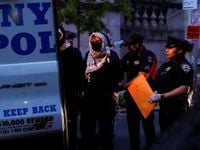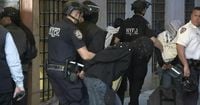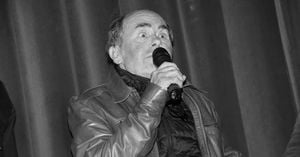On Wednesday, May 7, 2025, chaos erupted at Columbia University as dozens of pro-Palestinian demonstrators occupied Butler Library, leading to significant confrontations with university security and the New York Police Department (NYPD). The protest, which began around 3:15 p.m. in Reading Room 301, saw students and non-students alike demanding action against the university's ties to Israel, with some protesters reportedly renaming the library the "Basel Al-Araj Popular University" in honor of a Palestinian activist.
According to Columbia University Acting President Claire Shipman, the situation escalated when demonstrators refused requests to provide identification or leave the premises. "Disruptions to our academic activities will not be tolerated and are violations of our rules and policies; this is especially unacceptable while our students study and prepare for final exams," she stated, condemning the actions of the protesters as "completely unacceptable" and "outrageous."
As the standoff continued, the NYPD was called in to assist in securing the building after public safety officials reported injuries among their ranks during a crowd surge. Shipman confirmed that two Columbia Public Safety officers were injured as individuals attempted to force their way into the library. The university spokesperson noted that the police were requested due to the significant presence of individuals not affiliated with the university, creating a safety hazard.
Deputy Mayor Kaz Daughtry reported that approximately 60 to 70 individuals were taken into custody by the NYPD, with some estimates suggesting the number could be as high as 80. Footage from inside the library depicted demonstrators sitting peacefully, holding signs and taking photos, while outside, tensions flared as police attempted to manage the crowd. Eyewitnesses described a scene of chanting and drumming, with protesters standing on tables and unfurling banners.
"The flood shows that as long as Columbia funds and profits from imperialist violence, the people will continue to disrupt Columbia’s profits and legitimacy," the Columbia University Apartheid Divest group stated in a social media post. Their demands included a call for the university to cease investments in companies that support Israel's military actions.
In a statement, Mayor Eric Adams emphasized the city's commitment to peaceful protest while denouncing any form of lawlessness. "To our Jewish New Yorkers, especially the students at Columbia who feel threatened or unsafe attending class because of these events: know that your mayor stands with you and will always work to keep you safe," he said, underscoring the administration's stance on maintaining public order.
The protest comes in the wake of heightened scrutiny on Columbia University following previous demonstrations against Israel's military actions in Gaza. In late April 2024, pro-Palestinian protesters barricaded themselves inside Hamilton Hall, leading to multiple arrests and disciplinary actions against involved students. More recently, in March 2025, the university faced pressure from the Trump administration, which threatened to withhold $400 million in federal funding unless the institution addressed concerns regarding antisemitism on campus.
As the library occupation unfolded, students not involved in the protest were reportedly allowed to leave, while demonstrators were warned that failure to comply with identification requests could result in arrest. Videos shared on social media depicted the chaotic atmosphere, with some students alleging that public safety officers had engaged in violent confrontations with protesters.
One student, Franziska Sittig, described the scene as orchestrated, noting that it appeared the protesters had planned their actions in advance. "They came from different sides of campus, so it looked like they had definitely planned it before and orchestrated it before," she said, highlighting the premeditated nature of the demonstration.
Columbia University has faced ongoing challenges regarding its handling of protests and accusations of antisemitism. The Trump administration's recent policies have intensified scrutiny on the university, with federal officials launching investigations into alleged discrimination against Jewish students. In March, a graduate student involved in protests, Mahmoud Khalil, was detained by U.S. Immigration and Customs Enforcement, raising concerns about the treatment of international students participating in political activism.
The protests at Columbia are part of a broader wave of activism across U.S. college campuses, where students have rallied against perceived injustices related to the Israeli-Palestinian conflict. Columbia University Apartheid Divest, among other groups, has been vocal in its demands for divestment from companies involved in the occupation of Palestinian territories.
As the situation at Columbia unfolds, university officials are urged to address the underlying issues that have led to such significant unrest among students. The recent events serve as a stark reminder of the tensions surrounding the Israel-Palestine conflict and the challenges universities face in balancing free speech with maintaining campus safety and order.
The protests have sparked conversations about the role of academic institutions in fostering environments where diverse viewpoints can be expressed without resorting to violence or disruption. As Columbia University navigates this complex landscape, the implications of these protests may resonate far beyond its campus.





